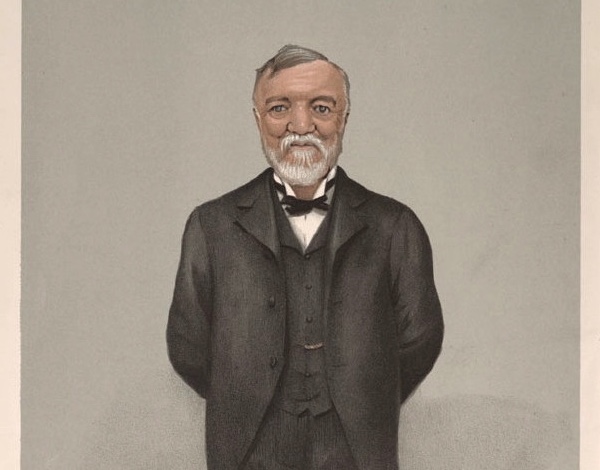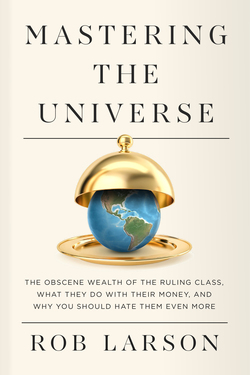

Carnegie caricatured by “Spy” for the London magazine Vanity Fair, 1903 – Public Domain
Defenders of ruling elites have seldom been satisfied with the argument that the rich deserve their wealth because of their grudging willingness to provide jobs for everyone else. Very commonly, the tendency is to celebrate the rich and powerful as being different kinds of people from the rest of us—suggesting that they built their gigantic companies up from scratch by their own almost miraculously superior knowledge, relentless drive, and willingness to make tough calls.
The works of Herbert Spencer, for example, were the Bible of the Gilded Age millionaire industrialists and financiers. Some- times called the Marx of the rich, Spencer claimed to extend to society the scientific insights of Charles Darwin, whose theory of evolution through processes of natural selection had revolutionized biology. Darwin claimed that competition by organisms for the scarce resources of survival meant the preferential reproduction of organisms well-suited to their natural environment, leading to the incredible variety of adaptations to every niche in the living world today.
Spencer claimed to apply this watershed insight to social analysis. But rather than organisms evolving by passing on traits suited to changing ecosystems, Spencer claimed in the competitive economy human individuals also had to fight for scarce resources, and those who became rich were the best-suited to life. And not just best-suited, it also turned out the rich were better people too, why just look at their elegant estates and their many luxurious pos- sessions and their fine diction.
Andrew Carnegie, the great Gilded Age steel monopolist, wrote, “While the law [of natural selection] may be sometimes hard for the individual, it is best for the race, because it insures the survival of the  fittest in every department,” although he frankly ad- mitted capitalism was creating “rigid castes” and called the wealth gap “the problem of our age.”6 Danny Dorling draws out the unflattering implications of these views in Inequality and the 1%: “It is remarkable . . . to have to acknowledge that some people really do believe that some of us are actually of ‘better stock’ than others. They don’t say this out loud, of course. Animal breeding metaphors are hardly acceptable as a way to talk about fellow citizens.”7
fittest in every department,” although he frankly ad- mitted capitalism was creating “rigid castes” and called the wealth gap “the problem of our age.”6 Danny Dorling draws out the unflattering implications of these views in Inequality and the 1%: “It is remarkable . . . to have to acknowledge that some people really do believe that some of us are actually of ‘better stock’ than others. They don’t say this out loud, of course. Animal breeding metaphors are hardly acceptable as a way to talk about fellow citizens.”7
More concretely, a paper for the Peterson Institute for Inter- national Economics found that while “the superrich in the United States are more dynamic than in Europe,” still “just over half of European billionaires inherited their fortunes, as compared to one- third in the United States.”8 That’s still a lot of inheritance going on, and for billions of dollars of wealth that are desperately needed by so many people.
But what research we have does not suggest the rich are superior to us, and in fact their wealth-drenched lives seem to lead in the opposite direction. There is a common, and institutionally encouraged, pattern of carefully hoarding wealth and keeping it within the family, and putting personal relationships, even marriage, beneath economic imperatives.
The heiress Abigail Disney wrote for the Atlantic about her inheritance and how she was “Taught from a Young Age to Protect My Dynastic Wealth,” especially once she came into the money at the age of twenty-one. She was “taught certain precepts as though they are gospel: Never spend the ‘corpus’ (also known as the capital) you were left. Steward your assets to leave even more to your children, and then teach them to do the same. And finally, use every tool at your disposal within the law” to keep the money from the government, which will only waste it on health care for poor people. She also learned to “marry people ‘of your own class’ to save yourself the complexity and conflict that come with a broad gulf in income, assets, and, therefore, power.”9 She adds, “Having money—a lot of money—is very, very nice . . . I have wallowed in the less concrete privileges that come with a trust fund, such as time, control, security, attention, power, and choice.”
And more specifically, we can turn to the body of rigorous social science research on the rich, which tends to reveal that they are assholes. A group of psychologists at the University of California conducted an impressive series of lab and field tests to probe the moral fiber of wealthier people and published the results in the highly prestigious Proceedings of the National Academy of Sciences. They found “upper-class individuals behave more unethically than lower-class individuals,” being in particular “more likely to break the law while driving, relative to lower-class individuals,” and in the lab “were more likely to exhibit unethical decision-making tendencies,” as well as to lie, cheat, and take goods from others.10 The first two studies involved assessing the class signals of oncoming cars at a California traffic intersection, and recording whether the driver obeyed traffic laws and allowed a waiting car to pass or in- stead cut them off. The second study replaced the second car with a pedestrian, with both studies finding that after controlling for other factors like sex, age, traffic conditions, and the time of day, “upper-class drivers were the most likely to cut off other vehicles” and “were significantly more likely to drive through the crosswalk without yielding to the waiting pedestrian.”
In the lab, participants were given a survey to state their subjective view of their personal social and economic standing, and given a well-established exercise to heighten class feeling, by comparing themselves to people with more or less money, education, and better or worse jobs. They then participated in simple lab activities to gauge behavior—being offered candy from a jar that the subject is told will later be given to a room full of children, meaning the more the subject takes, the less remains for kids. Richer subjects took more candy than lower-ranked subjects. Asked to privately roll a die and told the highest-total roller would receive a cash prize, upper-class subjects were more likely to lie to the experimenter and report a higher total roll (all rolls were pre- determined to sum up to twelve).
The psychologists then ask rhetorically, “Is society’s nobility in fact its most noble actors?” You can guess their conclusion. They chalk up the shitty behavior of the rich to their increased independence, both from economic need and from regard for others’ opinions, as well as having the resources to cope with any costs of their unethical behavior.
You can be high-class and pretty classless.
The post The Best Families: Enduring Ruling-class Alibis appeared first on CounterPunch.org.
This post was originally published on CounterPunch.org.